#Business broker san francisco
Explore tagged Tumblr posts
Text
First Choice Business Brokers San Francisco
About Us: First Choice Business Brokers San Francisco is a premier firm specializing in connecting buyers and sellers for successful business transactions. With expertise and integrity, we provide unparalleled service in the industry.




Contact Us:
Phone: (628) 587-0270
Address: Four Embarcadero Center, Suite 1400, San Francisco, CA 94111
Website: https://sfbay.fcbb.com/san-francisco
Facebook: https://www.facebook.com/fcbbsfb
Linkedin: https://www.linkedin.com/company/first-choice-business-brokers-sfbay/
Business Hours: Monday-Friday 9am-5pm, Saturday and Sunday Closed
Business Owner: Eric Johnson
#Business for sale san francisco#Business broker san francisco#Sell your business san francisco#Business valuation in san francisco#Buy a business in san francisco
1 note
·
View note
Text
Victor Makras - A Respected Business Professional
issuu
Victor Makras embodies the spirit of his beloved city. With a successful career in real estate spanning over three decades, he has established himself as a reputable broker and leader in the industry. Victor's contributions to the community are commendable, having served on multiple commissions and as President of the San Francisco Association of Realtors.
0 notes
Text
Acts of Love

Analyzing the situation from all angles, Roscoe, the fair arbitrator, the sole solid voice of reason for everybody in the neighborhood but himself, was left with the insufficient and constant truth that there was nobody in the vicinity to blame. With nobody to blame he had nobody to advise, and with nobody to make fun of his advice, all his shortcomings formed a cyclone of immaturity within his breast.
He made a split decision – he could make decisions; he was an adult – and phoned up the one person who could not be more physically separated from the problem if he tried. Heedless of what time it was in San Francisco, Roscoe phoned, and by the time the ringing cleared he had nearly convinced himself that he had found the right person to blame after all.
“There’s a problem,” he stated clearly, before any how-do-you-dos could pass. “And I’m blaming you for all of it!”
“You got it, sport,” Martin replied, those 2,000 miles of distance, in Roscoe’s opinion, unduly bolstering his confidence. “Tell papa all about it.”
-
“Solids,” Roscoe asked the room, “or stripes?”
“Ugh,” said Harper, “shirts with collars.”
Roscoe rotated the selection a minute degree to the stool on Harper’s left.
Jules didn’t even pick up his chin. “Boy clothes are boring,” he declared.
Roscoe twirled a 160 to the only customer in the shop. “Jackie? Stripes? Colors? For goodness sakes.” Jackie, a good two-fifty in his socks, was sumptuously unearthing himself from his own tank top. “We have a dressing room for a reason.” The dressing room was a shower rod and sheet stabilized with clothes pins, but it certainly existed.
“Jack,” Harper advised, “The three-strikes consequence is not so interesting that you have to keep testing me so.” Harper, in his own words, preferred to keep the chest hair out of the register.
“Yeah,” Jules said, “plus there’s a lady present.”
“A confident man prefers a visual opinion.” Jackie threw a wink at Jules. To Roscoe he threw: “A Saturday night event, and you need to wear a shirt? That’s barbaric.” He thumped away toward the shower curtain, swinging his rag.
“Sure, I’ll just go out the way I am now.” Roscoe gestured at his undershirt and his not-even-nice jeans. “I’ll go out to my meeting like a slob. Or nude. Apparently, this is all I need to strive for!”
“Wear the solid, Roscoe,” Harper said. “Don’t have a heart attack. I couldn’t possibly stand more excitement.”
Jules and Harper possessed similar levels of social astuteness (inconveniently high) but Jules’ sadistic appetite for discomfort presented the skill with far more aggression than phlegmatic Harper ever mustered the motivation for. He twitched upright, terribly alert. “A meeting on Saturday night?” He posed.
“Yes,” Roscoe answered mildly, stepping into Jackie’s vacated mirror. He’d known Jules four long years and knew enough to work him, a little. “The communications head for that men’s health initiative that sponsored the safer sex seminar we played host for. Remember, Pride? You helped set up the folding tables.”
“Oh.” Jules, turned off instantly at the whiff of an informational brochure or pamphlet, sat back in his stool. “That’s boring. I feel bad for you.”
“Kid, your compassion is an inspiration.”
Harper picked up what Jules had childishly put down. “You’re extremely stressed,” he observed, “about your choice of shirt for a mere meeting.”
“You only have one chance to make a first impression,” Roscoe replied. He liked the stripes.
“But you met this guy before,” Jules said. “You literally just said.”
“One of those professional, no-nonsense Saturday night corporate one-on-one meetings,” Harper continued. “Perks of the white collar.”
“Business in that world doesn’t work the same as business here!” Roscoe fended and fought and failed to keep Jules and Harper from listing toward each other in the malevolent mind-meld they could occasionally broker when their victims’ irritation superseded whatever pet animosity they held toward one another. Jules provided the energy, and Harper contributed the bulk of the riposte. “You know. The department heads are interested in utilizing our space again, but nothing is approved until a million emails have been sent – emails on a corporate server – and until the right person signs the right release, you can hardly get the ok to speak to a man.” He rattled the hangers. Now he hated both shirts. “And anyway,” he continued, “I’m lucky he’s even decided to broach the topic with me on his own time, so I’ll have all my cards on the table before the holidays. It’s really inconvenient for both of us. And it’s a matter of public health.”
“Come on me, not in me,” Jules recited. “That’s one, right? An old one? From black-and-white times?”
“You’ve known of this man since June,” Harper laid out, “so exactly how many dates have you been on?”
“It’s not a date,” Roscoe said, mainly to himself, to keep calm. “It’s an informal meeting.”
“Speaking of informal –” Jackie briskly swept the shower curtain aside and presented his torso to the room. It was encased in a series of canvas straps. The man possessed the most prehensile chest hair Roscoe had ever seen. “Little man,” (this was Jules) “my buddy, if my goal were to seduce a very cutie-pie cashier, say, seduce him outright and carry him to my home to have my will in all ways, would this design be the one that allows said cashier to be seduced? And if not, what improvements could be made?”
“You’d have to pinky-swear you’d eat him up all in one bite,” Jules suggested, “so he wouldn’t have time to get scared.”
Harper, stiff in the wrists and face red, retrieved his Tristram Shandy from beneath the counter and began to ignore everybody.
“Jackie,” Roscoe said, “Stripes? I like stripes.”
Jackie shook his big mug slowly. “Solids,” he said.
Roscoe gave it up and started for his office again. In the jumbled space, it was slow going. Jules called: “Solid. Solid color.” He sounded abruptly calm and steady.
“The striped is a little more…” Roscoe shook the hanger again and stared hard at the shirt, realizing once more that he could barely hold an opinion on it. He may as well argue, he had a couple hours. “Jovial? Fun?”
“That’s what we call you behind your back,” Harper said behind his pages. “Fun Roscoe.”
Jules, instead of taking the path of least resistance, slithered bodily over the countertop and came for Roscoe that way. “No, no,” he said, as if he’d devoted a miniscule percentage of time in his hindbrain to figure out the issue while he and everybody else had fun with their torment. “Listen, so you two are doing this stupid extended-coy thing. Informal corporate meeting, sure. Buy into it. That’s what this guy will expect. Who looks jovial at a meeting? Play the game.”
“Play the game,” Roscoe said to himself as Jules freed him from the hangers. He wondered how long Jules would be able to say that so casually before the rules and the years made things stale.
“That’s how adults think they have to play,” Jules said, so fiercely it was as if he’d overheard the passing thought. “Don’t blame me if you’re too scared to do something different. This one needs pressed.” And he shoved his way down the narrow hall and disappeared behind the basement door. He slammed it shut.
“He reminds me of this houseboy I had a share in, back in the eighties,” Jackie mused. He’d pulled on his tank top but he was a man who remained spiritually naked, no matter the coverage. “Only this one didn’t have the attitude. And we weren’t having him do the ironing.” He lounged now against the glass countertop and spoke past Harper, though ostensibly to him, as was his respectful habit with cute young men who evaded his understanding.
“I cannot possibly,” Harper repeated, in arctic timbre, “bear any more excitement.”
-
Roscoe had come around to the fact that he was not particularly respected. That he was appreciated – a walking, talking, emotional necessity – had only to do with the physical existence of his environment – the bar and the leather shop – and the fact that he’d taken it all over after Val died. This one responsibility assumed in 1989 had earned him an immovable seat in the scene, but he’d been frozen in community judgment at 22 – an anxious, retiring, conflict-averse functional alcoholic. At his glummest moments he wondered if Val had left things to him less out of any belief in his business prowess, and more out of the practical sense that out of all the surrounding men, Roscoe would always have the least going on socially.
You could have respect, Roscoe thought while he buttoned his solid-color shirt behind his narrow office door, or be appreciated, or be beloved. Most men only had one. A few could muster two. Val had been the only one he’d known who’d netted all three.
“And you’re fucking dead,” he said aloud, and tried to nab his reflection in the black computer screen. These were not the thoughts to rev yourself up before a date. He sought back in time, not to Val, but far more recently when he’d been down in the basement pawing through historical paperwork while Jules hunched, absorbed, over some strap or belt or harness in his little workshop. They’d passed several minutes in total silence until Jules, out of nowhere, spoke aloud with so much poison Roscoe whirled around, exceedingly hurt. Jules remained completely bent, eyes on his work surface. He was shaking with passion and so keyed up over some frustrating detail his face had reddened and his eyes watered. He wore headphones. Not only had he been speaking to himself, but he wasn’t aware Roscoe had come downstairs.
He said to himself now what Jules had said down there. “Don’t,” he muttered, hand on the door, “Don’t be a fucking loser.”
He had met Bobby at the safer sex seminar; he’d told the truth. At the end, when the bar had cleared out, he’d walked past a trim man around his own height, with a lot of loose brown hair. He wore a green linen shirt that appeared out of place in the grubby surroundings yet managed to look rather graceful and cool. The man had reached out and touched Roscoe’s arm. “They told me when they hired me that parties were one of the job perks,” he said confidentially, as though he and Roscoe were well known to each other, “but they didn’t mention I’d have to organize them all.”
Roscoe, idiot, had blurted out “Oh!” And then, recited Bobby’s email address, which was how they knew each other. Bobby had laughed and compelled him to sit down. For months Roscoe had been sneaking out the shop’s back door to meet him for coffee, brief pleasant chats that thrilled him, though he wondered what someone that corporate-cute got out of it. Roscoe was not corporate – he was not even particularly leather. He was what a lot of the gay men around were – a forty-two-year-old guy.
Bobby had been the one to suggest a dinner, albeit with coy hedging, but Roscoe had suggested he meet him at the shop “to meet the crew” as his own gesture of good faith. After the shirt debacle he doubted the wisdom of this, but he left his office bravely and made his way to the front. Jules and Harper remained in position – Jackie, to his disloyal relief, had lumbered away.
“Alright, I’m out,” he tried to declare, boss-like. “Please, no calls. Unless there’s a deadly emergency, in which case, please call me.”
“Don’t do anything I wouldn’t do,” Harper said.
“Yeah,” Jules said. “Whatever you do, don’t go out with this guy and finish your dissertation.”
Harper kicked out against Jules’ stool and upended him. At that moment the bell over the door jingled and Roscoe, distracted from the fracas, whipped around for what felt like the dozenth time that evening. “Hi!”
“Hi!” The nice thing about Bobby was that he naturally matched the energy of whatever greeting Roscoe gave. He looked pleasantly flustered coming out of the coolish autumn evening and fresh air blew in behind him. “Now I suddenly forget your name,” he directed to Harper, who was busy shoving Jules’ yapping head below the counter. “But I know it starts with an H.”
“Hello,” Harper said.
“Hello!” Bobby repeated, delightfully awkward.
Jules, behind Roscoe’s back must have resurfaced, for he gasped so significantly he gagged on air. He said, overloud: “Oh no!”
Roscoe wanted to ignore it; he could have ignored it, if he hadn’t seen the pleasure, all at once, drain from Bobby’s expression. He turned and saw Jules, wide-eyed with a transient horror that struggled not to jitter toward amusement, as if he had just become aware he’d laughed at a joke full of slurs. “Oh no,” he said again, and clapped a hand over his mouth. Jules was not someone who voluntarily shut himself up.
Roscoe looked back to Bobby, whose face was overcome with irritation; it de-aged him considerably. He folded his arms and drew himself up into a neat little package. His jaw set harder than Roscoe had ever seen it; He had the feeling this is what Bobby looked like in meetings.
A cold wind sucked through Roscoe’s bowels. “You two already know each other,” he predicted, and lapsed into a little horror himself, at the obvious innuendo.
“Not like that!” Jules said through his fingers.
“A little like that,” Bobby said coolly. “Only the matter of how and with who are not as clear. The shock on your face! I would think,” he continued, with nastiness Roscoe hadn’t thought him capable of, “you’d be used to this kind of thing happening to you!”
To Roscoe: “Should we go along now? I think we should.” His painful smile brought Roscoe gallantly out of his stupor. “Yes, yeah,” he agreed. “We’ll talk about it later.”
He ushered him gently out the door; the idyllic bells jingled; the smell of dying leaves and of balcony gas fires cleared their heads; and behind them among the brightly lit hedonism, Harper, triumphant enough to be heard through glass, intoned, “have any other smartass thoughts about my fucking dissertation now, you nasty little slut?”
-
In months past, Bobby had always been collected and softly confident in himself. Any faux pas or nervousness on Roscoe’s part had been gently absorbed and accepted by his mere mildness. Now, Roscoe found himself squiring a virtual teenager to dinner. They sat out on the restaurant’s patio, but Bobby cast his head around rapidly at any loud, passing group. His left hand unconsciously picked at its own cuticles. He carried on a staggered and desperate conversation with Roscoe about something funny that had occurred at work until Roscoe, ashamed he’d let this go on so long, found the little bit of steel he kept inside himself for these moments. He reached out and touched Bobby’s stiff hand, clenched through the gaps in the garden table. “Listen,” he began, but Bobby crumbled instantly.
“Oh my god,” he moaned. “I’m acting like a moron. I know.”
“No,” Roscoe insisted. He had enough experience to know the less he spoke, the more Bobby would blurt out. This was the function of Roscoe in any scene. He knew so many sordid secrets he was surprised no uptight bar queen had had him assassinated yet.
“I didn’t sleep with that brat,” Bobby explained. “Let me emphasize that.”
“I believe you,” he said, brat tweaking him inside, even as Bobby’s hand relaxed in minute segments.
“About a year ago,” Bobby continued, his eyes fixed on his and Roscoe’s stacked fingers. “I was in a relationship, an open relationship, so to speak. And it was open because, well, the man – Neil – he lived with me at that point – well, he was an animal.”
“Right.”
“I mean,” Bobby’s eyes widened, and he traveled off into some kind of fugue. “He possessed absolute filth. He was such a stud. He carried me off. I was astonished he was interested in me at all. I was literally possessed. He pushed you back into a wall and you just blacked out. My friends were mortified. I worshipped him, in private, though I could be such a catty bitch about his adventures; adventures where I was not included. But he could be, you know, very kind about it. He’d touch your face and ask why you were so worried. He kissed in public and held your hand. He wasn’t a malevolent person.” This came out in one long, humiliated gust. “He was sweet and relaxed, even when I was furious with him. Before that, I attracted boring men – you know, administrative people – and boring wouldn’t be so bad, but boring doesn’t mean nice and gentle. There’s nothing worse,” he said with some savageness, “than a boring, corporate, unkind man. And I dated stacks and stacks of them. Then Neil.”
“Neil.”
“Right.” Bobby held Roscoe’s hand proper, now. “Now, the rule was that he had to let me know if he was embarking on some conquest, and he wasn’t allowed to bring anybody back to my apartment. He was always bad about the letting me know part before the fact. It was always a “by the way honey” after the fact. And I put up with it, and I put up with it, then one night I came home unexpectedly after a work retreat was cancelled, and there’s Neil standing up in the kitchen, just roped with sweat, extremely post-post, just a towel over his shoulders. He said casual as you please, hi babe! Then guess who strides out of my bedroom.”
“Oh dear.”
“Not a stitch on his body,” Bobby gilded the image nicely. “He sees us both; He read the situation instantly, I give him that – He says, oh no! Just exactly how he said it back there.” Softer, and more dangerous, “with that stupid look on his face, like he was trying not to laugh at me.”
Jules, Jules, Roscoe chided in his brain. It was an automatic reflex, with the real culprit vanishing, as they always could, into the sexual ether of the past.
“It was one thing when he was going behind me to nail people his own way, his own age, his own level,” Bobby continued. “But seeing his aftermath with what looked like some teenager – these hot new young things coming up behind us, not a care in the world – that was the last straw. I’d gotten used to humiliation, but this was the kind that makes you see yourself. And I saw myself – this pent-up, boring, unkind, thirty-five-year-old admin sissy, obsessed with the sexual propriety of some goddamn hustler. I was better off sticking with my own kind.”
They ordered; they lapsed with the words for a while.
“It’s so stupid,” Bobby said quietly at one point, “To be heartbroken over what amounted to dumb sex games. You get older and older, but you can never get older than that.”
Roscoe had used this time to consider his next move. “Listen,” he said, drifting forward in his seat. “How much money would someone have to pay you to go back to being in your early twenties?”
Bobby released something; He laughed out loud, enough that he closed his eyes. “Oh god!” He cried out. “Awful! Awful!”
Roscoe shook his head. “Not even millions,” he said. “Not even.” He was pleased to find he agreed with what he was saying: not for a million bucks, not in a million years. “I think he’s a good kid,” he ventured, bolder. “Down in it, he’s a good kid. He’s running a little wild now. Most of them are. But, Bobby,” he said, more insistently, “There’s nothing to be jealous of there.”
“Skinny,” Bobby offered. “Youthful energy. Plastic brain. Full head of hair, no greys.”
“Puppy dogs online have more money than he does,” Roscoe said bluntly, walking the tripwire; he had two people to try not to betray. “He lives in an illegal basement. He works at Domino’s. He can’t get along with people his own age.”
“Demonic sex powers.”
“He’s treasurer for the neighborhood gay bridge club,” Roscoe countered. This did the trick; Bobby cackled briefly, then stifled himself out of kindness.
“Alright fine,” he agreed. “Fine, you’re right. I’m better than all that now. I should be glad about it.”
“You shouldn’t regret that you were brave enough to have your heart broken,” Roscoe said. “The only man I ever let break my heart was my father.”
Bobby had softened now to pre-Jules levels. “If I have a glass of wine with dinner,” he asked, “will we still be able to kiss goodnight?”
“Oh sure.” He mustered all his power to appear nonchalant about such a thing happening. “I’m not someone who’s particular.” Which was, miraculously, the first lie he’d told all evening.
-
He’d returned to the shop at the end of the night alone, meaning to placate Jules, but he only found Harper, who smirked to himself while he balanced the cash register. He was lighthearted for once and greeted him cheerfully, so Roscoe could guess he’d battered the complementary tale out of Jules, who’d been slick enough to slip away into the night. “Well, it’s not a big deal,” he said firmly as Harper’s smirk evolved into a one-sided grin. “Bobby and I talked, and he understands. It’s nobody’s fault, it's just an awkward situation.” He was still a little dizzy from the kissing and didn’t have the energy to scold Harper, who appeared truly gleeful with misfortune.
“Oh certainly,” Harper said. “Merely an awkward situation.”
Roscoe shot him a warning look with zero heat behind it. “Let the heterosexuals wreck their own lives about insignificant crap like this,” he lectured. “I should hope we are a little more sexually evolved than that.”
“Fags aren’t sexually evolved,” Harper said, “They’re sexually primordial.”
“And if you want to keep working here,” Roscoe shot back, “may I suggest you quit talking like you aren’t one?” This was about as rough as he could get with Harper, who primly returned to his steno pad.
But he overestimated Jules’ resilience – he stayed away from the shop for three days straight. It was his habit to lurk in the basement and putter regardless of if he had a piece on order and Roscoe was truly stumped. He was under the impression Martin had scrubbed most of the shame out of the kid. He settled on the idea that Jules was sulking over his privacy being pierced and, feeling sneaky, he made another date with Bobby on the fourth evening, when Jules was set to cover for Harper behind the register.
At the appointed hour, Jules sailed through the back door with his eyes half-shut and his face arranged into a careful, bland portrait. To Roscoe he said “Hey,” as if he’d been in the basement all week.
“Been busy?” He truly didn’t know – he had made it a rule not to pester Jules by phone.
“Sure.”
Jules kept one eye on Harper, who was grinning again as he stuffed graded papers into his satchel. He kept quiet until he could no longer resist. “There’s plenty of time,” said Jules’ older and blonder mirror-self, “to hide downstairs, baby child.”
Jules turned on Roscoe, betrayed. “You did not.”
“There’s nothing to do.” Roscoe flicked through his wallet, attempting to appear a bastion of mature calm. “It’s not a big deal. It’s not a big deal at all, so just relax.”
“I’m not talking to you about this.”
“That’s just fine,” Roscoe said. “There’s nothing to talk about. Because it’s not a big deal.”
He couldn’t understand the outsized misery emanating from Jules’ slumped shoulders. He looked like a gangling, tortured foal. “What’s wrong now?” He asked, too gently and too late, because Jules was already facing away, and Bobby was already jingling through the door.
“Hii-iii-!” Harper greeted him first, happy as a clam.
Bobby smiled weakly. “Hi,” he said softly, toward Roscoe, and Roscoe was touched that he was trying. “Jules, hello.”
Jules was utterly still. “Mmhmm,” he mumbled, and Roscoe, suddenly a bit sick with foreboding, wanted to grab Bobby and rush him out the door. But Bobby was graciously (relentlessly) coming forward.
“Now hear me out,” he said, mildly. “I was surprised. I still had some feelings about the whole situation. But it’s over with now.” He shrugged and offered his hand (Jules literally leaned away). “Let’s just forget about it,” he suggested. “Let’s leave it with Neil. Wherever the hell that devil is.”
“Yeah.” Jules woke up and allowed himself to shake hands, though he let go snappish. “He was, uh, a pretty active guy.”
“Oh, I certainly know.” Bobby moved toward Roscoe.
“I mean, I know too.” Jules barreled forward, an uncontrolled tone entering his voice. “As in, I knew. Like, knew him. Knew of him. For like, a year before that night. But like, maybe you weren’t even seeing him at that point?”
“Probably should head out now,” Roscoe suggested, but Bobby planted his feet.
“Like,” Jules said, his face a mask of blank horror, as if he were under some horrible influence and couldn’t possibly stop speaking until all was revealed. “Maybe you weren’t even seeing each other around, uh, fall-winter of 2008? Because that’s when we were uh, most active. Together. With others.”
“Pardon me,” Bobby said, “others?”
“Yeah,” Jules answered, totally helpless. “You know, the gangbangs.”
“Gangbangs?”
“Not that I arranged that,” Jules swerved. “My old man at the time arranged all those. But I was there, as, you know, the subject of the evening. And Neil was a participant uh, most of the time. And sometimes individually, for house calls.”
“House calls?” This was Harper, cross-legged on the carpet, clutching his satchel and likewise paralyzed by the situation.
“But maybe you weren’t even seeing him, at that point,” Jules repeated, like saying it enough times would make it true. “At that point, fallish and winterish of 2008?”
Roscoe gripped Bobby by the shoulders, unwilling to move him extrajudicially, but hoping to impede him if he lunged forward. Jules, for his part, did not bodily retreat.
“No,” Bobby answered at long last, his voice a monument of cold dignity that surpassed even Harper’s abilities. “No,” he repeated. “No, I was not aware of the gangbangs. Or of house calls. I was also not aware that my boyfriend, at the time, was some kind of doctor to small animals. Let’s go now,” he said to Roscoe, and revolved gracefully underneath his hands without dislodging his grip. “I’d like to leave now.”
“Right,” Roscoe agreed. He ushered him out, pained that he couldn’t discreetly look back. No tender autumnal milieu appealed to his senses this time, and Harper, struck as dumb as everybody else, made no glass-passing remarks. When the door slammed, the door slammed.
-
There were, to Roscoe’s dismay, no vulnerable talks this time. Bobby, drawing on some kind of work persona for power, handled the evening and the conversations with brisk, friendly professionalism and relaxed only a few degrees when it became clear Roscoe wasn’t going to push the issue. And it would have been fine, if this had ended that evening – it lasted through the whole week, and into the next. Bobby took the date-arrangements into his own hands, and they met away from the shop. This way, he gradually recovered some of his previous warmth, but he swiftly hardened anytime Roscoe brought up some doing or event connected to the shop or bar. He couldn’t even mention Harper without Bobby’s eyes glazing over protectively. Roscoe didn’t bring up Jules’ existence whatsoever, and this, after barely seven days, made him feel like a real piece of shit.
He understood, at last, that he’d made it as a gay man past forty and had never had to delineate his life in even trivial ways. His friends were everybody else’s friends, his job was everybody’s trivial and unhealthy sanctuary, and he never had any reason to hide himself. When he could no longer bear his family, he’d left them. When his AA sponsor reared his head with too much religion, he’d broken off and made his own sobriety group. When those sober friends got snitty about him owning a bar, he’d walked right through them and continuously among them and left them free to leave or stay or slink back, however they needed. He’d never considered himself a person with principles until now, when it seemed impossible to heed their calling.
He newly considered the position of Jules and Harper, who were still too fresh to be beloved or appreciated or respected. Without the stability of those prisons, they floated in some hellish erotic no-man’s land, out of sight of their own peers, hobbled economically, excised from shared history, right or wrong. He remembered Harper, years ago, a scrawny little adjunct with Kurt Cobain’s hairstyle and fire in his face, charging through the doors with his retail resume hot in hand. He recalled Jules, not as many years ago, speaking very calmly, face half-maimed and half blind, no resume, inquiring about the antique sign in the window, leather bespoke, custom order. (I’m afraid it’s an old sign, Roscoe had said, horrorstruck that Jules was even upright. Do you consider that a wise business decision? Jules had replied, blood down his chin, speaking crisply through pink teeth). The hot new young things – sure.
And Bobby, neighborhoods away all this time, on another planet practically, lost in all this context, buried enough to be oblivious to it. He greeted Roscoe now with apprehension in his eyes that lasted and lasted and only vanished at the end of the night when they were separating anyway.
“Listen,” Roscoe said, but he didn’t know what to say and he didn’t know what to do.
“It’s alright.” Bobby petted his cheek. “It’s alright. It’s nothing.”
But he’d begun to make small, suggestive comments, very skillfully (a doctor to small animals), in ways Roscoe couldn’t counter – mostly about groups of young gays when they passed. Bobby would say something brief and clear and cruel and just as quickly shut it down and peer at Roscoe from his peripheral, observing the tested waters. A talent for verbal knackery could, would, be used just as easily for personal self-satisfaction as well as for social good.
And Jules, still a teenager at heart, but beholden to his adult ambitions, showed up at the shop as usual but dealt with the situation by refusing to speak to Roscoe whatsoever. He was hurt by this apparent anger, and once when he tried to come down the basement stairs behind Jules, the kid had shouted, brutally, over his shoulder: NO!
The fathers Roscoe had known had mostly been deplorable; He didn’t like feeling he’d become one himself.
He called Martin.
-
“Leaving so soon, gangbang boy?” Harper called out after the basement door slammed shut.
“You,” Jules answered, walking around the counter, and deliberately smashing every metal outcrop of his bag and kit and equipment into its locked glass cabinet, “are not pretty enough to be this mean. No wonder you haven’t had a boyfriend in years.”
“And where’s your boyfriend?” Harper stretched his arm across the counter to block Jules’ way. “Roscoe called and said he wants both of us here. I know he must have texted you; you shouldn’t be leaving.”
“I can do whatever I want.”
“Oh, you demonstrably do.” Jules dropped all his things on the ground at once, with the following expected awful noise. He deliberately made rackets when you didn’t want one and was still capable of supernatural silence when it suited his needs. “I don’t know why you’re acting like a child. If you’re old enough for high-risk sex, you’re old enough to handle high risk consequences.”
“This is not a natural consequence,” Jules argued. “This is a bizarre fucking freak-ass coincidence because god hates me.”
“And before the freak-ass coincidence interfered with your comfortable situation,” Harper poked and prodded, “you seemed perfectly at peace with the fact that you had probably ruined somebody’s relationship.”
“Neil was a high-risk person to be in a relationship with.” Jules’ voice pitched raggedly higher and higher, as was so whenever he got too excited. He started pulling together his bags again. “I knew it after he fucked me once. If Bobby didn’t figure that out after knowing him for years, then he was a fucking moron.”
“And you’ll tell him that to his face, too,” Harper said. “To Roscoe’s only beau!”
“Why not?” The front door jingled and opened broadly. “If he’s going to act like some wounded bitch every time he sees me, why shouldn’t I get the jump on him? But not now.” Jules turned and collided with a familiar, half-bare chest.
“Oh, fuck off,” he wailed, backing away from what he knew, in his experience, was an immovable surface. “Will everybody quit fucking interfering with my shit?”
“Now, now,” Jackie said, unbothered as usual. He topped Jules’ shoulders with his heavy hands. “What’s the hurry?”
“Jackie,” Jules asked, immediately popping on his most fetching impersonation of innocence. “If I asked you to carry me away right now, out the door past everybody to wherever you wanted to take me, would you do it?”
Jackie appeared to regard these words visually. “Mmm-mmm. No.” He shook his head with some regret. “I’m sorry, little brother. We have to face our fears.” He grasped Jules’ ribcage in a paralyzing, two-handed grip, lifted him like a hollow doll and propped him on the countertop next to Harper’s register. Jules, kitten-rigid in some kind of tonic seizure, grabbed two handfuls of Jackie’s shirt in shock. And there wasn’t much shirt to spare.
“Alright now,” Jackie said, satisfied that all was right in the world – his world. “Who can tell me what all the emotions are about?”
“He’s upset because him being a massive fucking whore has preemptively ruined Roscoe’s first relationship in years,” Harper supplied, testy about the no boyfriend line himself.
Jackie, in a rare event, looked directly at Harper and with some disapproval. “I never understood,” he said, “any m or bottom’s insistence that swear words are for them to say. I’d leave the heavy language to the men, son.”
Harper, too proud to slump, merely narrowed his eyes and dragged his nails across the counter.
“I just said like three swears,” Jules interjected, with jumbled loyalty. “And that’s after you came in.”
“Harp’s older than you, he should know better.”
“Well, he’s right.” Jules had to look askance to say it. “I was a huge whore and I ruined Roscoe’s life, and I don’t know what to do.”
Jackie nodded, then thought twice, and shook his head solemnly. “Don’t understand at all, sorry.”
Jules rapidly regained coherence. “I homewrecked a guy a year ago,” he explained. “And he showed up just now as Roscoe’s new boyfriend, and he hates me. And turns out, I’d been homewrecking him for the year before that too, only I didn’t know it due to the uh, casual nature of the events.”
“Ah,” Jackie said, in an enlightened way, as he and Jules realized a common language. “Gangbangs. Martin was around.”
“Right,” Jules said, relieved. “But now he’s not, and I fucked it all up.”
“You young people. No, no,” he said toward Harper, who’d been about to interject, feeling lonely in the conversation. “Young people. You let any problem that happens now ruin all the good things that happened before. Calling yourself a whore – since when is that your job? Boys should be happy – they should smile and laugh and bounce around and feel good about turning over.” He cast, again, a significant look at Harper.
“I’m going to find a way to kill you,” Harper said. “Silently. When you least expect it.”
“Sure you will – you’re a lot smarter than me.” He turned back to Jules, who had restlessly moved his grip from Jackie’s shirt to his biceps. “Listen,” he said, kindly, “you’re taking responsibility for things that aren’t your business to take on. Martin did what he did to you as an act of love. You behave the way you do as an act of love toward him, even if he’s gone. I’d be pretty sad if you kicked yourself around because another adult got their feelings hurt.” Jackie, again, peered tangibly into the open air. “Some guys, adult guys,” he continued, “just can’t bear to know how intimately we’re all connected. Spooks them. Roscoe’s guy, he can learn. I won’t judge him, never met him. But it’s a lot easier if you never get to be that way in the first place.”
Jules, by this time, was gazing intently at Jackie’s bland, stereotypical face as if he had to absorb all the answers from it before cynicism again wised him up. In a moment of weakness, he dropped his forehead on one of his square and improbable pecs – Jackie, briefly and appropriately, patted Jules on the head, and even Harper looked uncertain about scolding the proceedings. He lucked out, because just then Roscoe, accompanied by a morose Bobby, strode through the front door.
The sight of Jules on the counter, being publicly snuggled by a creature like Jackie, was simply too much for Bobby to bear. He shot out, the snake that rears with eyeball-lancing precision, “Oh god! You let him carry on in your own business?”
“Bobby.” Roscoe grabbed his forearm. Bobby shook free.
“It’s one thing when you carry on in the privacy of your own home,” he spat at Jules. “Or should I say, more accurately, in one’s own basement squat?”
Jules, held back by Jackie’s huge paw, forgetting every single lesson he’d just attempted to absorb, shrieked with rage. “You haggard, unloved queen! Fuck you!”
“I’d rather be a haggard queen than a used-up slut!”
“I’d rather be a used-up slut than some neocon society faggot!”
“It’s always you uneducated goddamn children slinging around correct phrases like neocon, because you’re all too goddamn selfish to give your all to one person!”
Harper, who’d taught Jules the word neocon, just barely opened his mouth before Jackie valiantly drew him and stool both toward the protection of his insane body.
“Maybe if you really were giving your all to Neil,” Jules continued screaming, “he wouldn’t have been fucking cheating on you every fucking second of every fucking day!”
“– With fucking whores like you making it possible –!”
A clothing rack tipped; seemingly of its own accord, it tipped and terminated the human outburst with its own; Harper yelped, christ, the slings! as though they were made of glass,and Roscoe, arm outstretched for reasons nobody had actually seen with their own eyes – they’d long forgotten he was there – bellowed in the loudest voice any of them had ever heard him use:
“BE QUIET!”
Everybody, quiet; they froze in place too, all except Jackie, who fully turned around with great interest, thrusting his chest out hard as if he needed it to properly hear. But Roscoe was turning on Bobby, now shaky in the knees and white in the face. He touched his mouth, like he didn’t understand who on earth had just passed all those insults.
“That is unacceptable,” Roscoe said to him.
The shop space, its contents so incongruous with what was going on, seized the words and froze them. The air twanged and vibrated.
“That is unacceptable,” Roscoe repeated, gaining power. “It’s always been unacceptable, and it’s my fault for not telling you before, but I’m telling you now: you can’t talk to my employees like that. You can’t talk to my friends like that. I’m not interested in someone who feels they have a right to speak to people like that; if that’s so impossible for you to quit doing, then this stops right here. Bobby? This stops here. Right now. There’s no compromise. Do you understand?”
Bobby had clutched one arm around his stomach, as if seized with sudden cramps during this speech. He wiped his face with his hand, words out of reach.
“And you!” Roscoe turned on Jules, who leaned so far back on the counter he was in danger of injury. “You, buster, are not nineteen anymore! You’re old enough to know when you should act like the bigger man! No screaming! No silent treatment! And quit saying faggot! Both of you!” He gracefully included Harper; nobody was left out.
Everybody, stunned, waited for something. Nobody knew what.
“I’m sorry,” someone said quietly. It was Bobby, who among all in the shop, was the only one standing alone. “I’m really terribly sorry. I’m acting exactly as –” he cut himself off. “Well, exactly as was said. And it might seem easy to say this,” he explained, this time to Roscoe. “But I’m truly ashamed right now. I don’t know what to do.”
Roscoe struggled not to wilt in the face of this weakness. “I want you to apologize to Jules,” he said, doubling down.
Bobby veered toward Jules like a well-trained child. “Jules, I’m sorry,” he said, very simply, and seemed on the verge of saying more before a surge of emotion disfigured his face; he hid again behind his hand.
Jules contrary to the situation, whispered to Harper: “what do I do?”
“Traditionally, one accepts,” Harper advised.
“Right,” Jules said. “I accept. Uh. Sorry for calling you a neocon and the f-word and haggard and unloved and a queen.”
Bobby laughed shortly and bitterly, almost on the verge of tears, and not one of them would have known how to move forward if not for Jackie, who cleared his throat and said, quite loud, “Roscoe, have you seen that shithead Danny Bride sneaking around at all?”
“What?” Some of Roscoe’s signature haplessness retook; after such decisive behavior, the change was like a douse of cold water. Everybody looked around confused, freed from some spell. “I don’t – pardon me?”
“Well.” Jackie scratched his head, one of his other favorite gestures, and stepped away from the counter. “If you see him, tell that chickenhead the longer he stays away from me, the worse I’ll rip him up. Don’t parse it gentle – he doesn’t really understand stuff that way.” Jackie approached Bobby, who leaned back, stunned. “I’m Jackie,” said Jackie, and he held out his hand. He shook the tips of Bobby’s offered fingers in a gentlemanly manner. “Jackie. You’ll see me around. Pleasure to meet you.”
“Enchanted,” Bobby said, his eyes now dry and stable.
“Right,” Roscoe said, as Jackie trundled through the door exactly the same as he’d entered it. “Right. So, there’s that. And now,” he placed his hand on Bobby’s shoulder. “If you don’t mind, we have reservations, don’t we?”
“We do,” Bobby said, a little thick in the throat and not unsurprised at Roscoe touching him. He did not touch back, and something about the pain of this unmatched gesture made Jules and Harper start bustling around for anything to do but watch. “Yes, if you like, we do.”
“I’ll be back later,” Roscoe called out as he led Bobby away. “And one of you should really fix that rack. You know, if you aren’t too busy working.”
“Sure, big daddy,” Harper said. “Say the word and I’ll polish the boots you don’t own.”
Roscoe, the bigger man, let this go unchallenged. The door jinged and janged.
Jules, quick to recover and his enviable plastic brain ready for life’s next great mystery turned to Harper and asked, “how come Jackie knows you’re a bottom?”
-
Outside, far enough from the shop door but not enough from the bar, Roscoe grabbed Bobby and swung him around. “I’m not actually a yeller,” he said.
Bobby blinked, once at him, once toward the smokers lounging on the façade, then he seemed to give up and held Roscoe back – he didn’t notice.
“I’m not,” Roscoe insisted. “I don’t shout. I don’t make demands. I’m not that kind of person. But I couldn’t stand myself if I didn’t do everything possible to live with myself and keep you here. Because I want all of this. I want all of this, alright? These are my people and I want you here with me. Are you listening?”
Bobby, now eloquent beyond words, stared back at him with due attention. Roscoe understood exactly what Neil had seen in him – he had looked at the right time and caught a moment of breaking-open in a face that could be kind or cruel. An opening so large and so tender you thought you could stick your hand in – but you couldn’t – and Roscoe, looking back on what he had assumed of Bobby before, knew he’d been blind to the man right in front of him, this stranger peering into his face right now, who wanted to meet him too; the regular guy that he was.
The previous night, over the phone, after laughing himself sick over the sexual hijinks, Martin laid down his own reasoning. “Can I tell you,” Martin had asked, “about a mindset that helped me when I was in a tough spot about what my relationship with the kid was going to be? There were the usual issues with honesty and fear, on both sides. But, you know, all that stuff gets carried along by the realities of the situation as they present themselves. The age difference, being one of them. Which some might call significant to unacceptable.”
(I’m aware, Roscoe had said, bitchy – Bobby was only six years younger.)
“It’s especially hard when the younger in that kind of situation has only ever had shitty experiences with adults in authority. Grown-up is such a fuckless phrase, isn’t it?” Martin remarked. “Kids don’t like grown-ups. They don’t want to bang around with grown-ups. They don’t want to trust grown-ups. But boy, when you look like one, especially in comparison, it’s easy to act the part, right? And maybe a little bit of you – him, whoever – does need a grown-up sometimes, but you can’t sustain a mature relationship like that. You know, a mature relationship with the works. Anyway,” Martin continued. “I sort of had a talk with myself. Then I had a talk with him, about what I was going to do – what I was going to do, listen – and what I was going to do, was start giving him very real, very tangible experiences to help him work out emotionally that I wasn’t a grown-up – I was a man.”
He waited, sat with the obvious to see the deeper meaning beneath what Martin was saying, before realizing Martin was not that kind of person – none of his friends were.
(You’re telling me to man up? That’s it?)
“I am, huh,” Martin said. “Yeah, that is exactly what I’m telling you to do. Because you’re the boss, and those are your employees, and that’s your boyfriend. They may whine and cry and get scared, but they need you to act the part. They’ll either calm down that they have a lead to follow – or they’ll man up themselves one day, god willing.”
(And how exactly does a man discover the right decision to make? The right decision that gets him everything he wants?)
“Let’s not get too essentialist,” Martin said. “Nobody on earth gets the privilege of one-hundred percent certainty. That’s what makes our choices so important. Even if things go wrong, now or in the future, we have to know the decisions we made in the moment were acts of love.”
Martin paused for a long time. Roscoe could literally see him shrugging, oh well! From 2,000 miles away, the sadness was, for a millisecond, awful and acute. Then it was gone.
(My old man set those up for me. Is that what he called you?)
“No,” Martin had said. “Jules called me Dad.”
Roscoe, back in the moment outside the bar, held Bobby in his arms and had not a clue what the next move would be to give everyone everything they wanted. But Bobby, in his own wisdom, let himself break open further.
“I don’t want to impede on your plans,” he suggested, shyly. “But exactly how attached are you to those reservations?”
Down the street, in the opposite direction than planned, arm in arm. Roscoe had seen it happen to others plenty, and now that he was living it, wasn’t sure where his mind was supposed to be besides anchored to some bizarre, blank emotion others would call calm. Bobby might change his mind before they reached Roscoe’s apartment; he might not. Roscoe might choke in bed at the critical moment; he might not. He put his arm around Bobby’s neck and walked in the dark and hoped he’d be strong enough to put his arm around the whole rest of his life. Everywhere, he thought, thousands of people were rolling over and doing just that, staring forward at a bulwark of love that might fail – and they put their arm around it.
These are the acts that convince us we’ve become adults, Martin had said.
It stings; right?
18 notes
·
View notes
Text

“San Francisco – P.M.S.S. Co.’s Wharf- Off for China and Japan” c. 1874. Illustrator unknown (from the collection of the National Parks Gallery).
Ships, Sheds and Wharves: Chinese and the Pacific Mail Steamship Co.
The earliest history of the Chinese in America remains intertwined with the Pacific Mail Steamship Company’s sheds on San Francisco’s wharf and the broader narrative of maritime transportation, immigration, and economic development during the 19th century in California. Founded in 1848 as a response to the California Gold Rush, the Pacific Mail Steamship Company (“PMSSC”) aimed to carry US mail on the Pacific leg of a transcontinental route from the east coast of the US to San Francisco on the west coast via Panama.
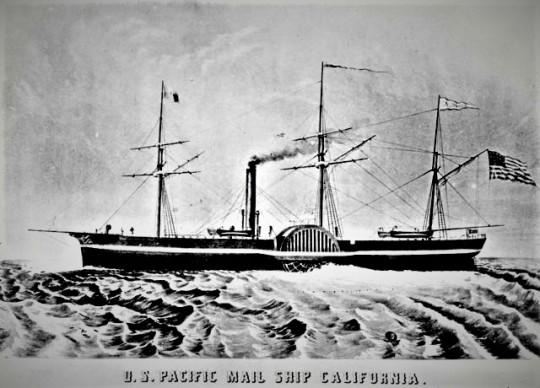
Illustration of the steamship SS California, the first ship of the Pacific Mail Steamship Company. Only a few passengers were on board when the ship left New York on October 6, 1848. By the time the ship reached its stop on the Panama’s Pacific coast, word had spread of the great new find of gold in California. Over 700 people tried to get passage on the ship in that harbor. The Pacific Mail agent managed to cram 365 people aboard the ship before it set sail for California. The ship and passengers reached San Francisco on February 28, 1849, where all but one member of the crew deserted the ship for the goldfields. The ship was lost in a wreck off the Peruvian coast in 1894. (Illustrator unknown, from the collection of the US National Postal Museum)
The discovery of gold in the Sierra Nevada in 1849 produced a massive influx of people to California
from all over the world, including China. According to historian Thomas W. Chinn, “Hong Kong was the general rendezvous for departure to California. The emigrants usually stayed at dormitories provided by the passage brokers or at friends' and relatives' homes until the day of embarkation. The earliest ships between China and California were sailing vessels, some of which were owned by Chinese. . . . However, most of the ships in the early days bringing Chinese immigrants were American or British owned. At the time the shipping of Chinese to California was a very profitable business.”
The voyage in sailing vessels across the Pacific varied from 45 days to more than three months. Chinese passengers typically spent most of the voyage below decks in the overcrowded steerage. Conditions aboard the ships varied with the ship and shipmaster. In March 1852, 450 Chinese arrived in the American ship Robert Browne bound for San Francisco objected to the captain's order to cut off their queues as a hygienic measure. They rebelled, killed the captain and captured the ship. According to Chinn, “health conditions on the bark Libertad were so bad that when she sailed into San Francisco harbor in 1854, one hundred out of her five hundred Chinese passengers and the captain had died during the voyage from Hong Kong.”
In 1866, the Pacific Mail Steamship Company (“PMSSC”) entered the cargo and passenger trade to and from the Orient. As the sole federal contract-carrier for US mail, the PMSSC became a key mover of goods and people and a key player in the growth of San Francisco, California.

“257. Pacific Mail Steamship Company’s Wharf” c. 1869 -1871. Photo and stereoview by Eadweard J. Muybridge (from a private collection). The Pacific Mail’s wharf at the foot of Brannan Street in San Francisco at the approximate location of its old Pier 36. This was the first waterside view of the city for virtually every Chinese immigrant making landfall in San Francisco.
For the first six decades of the Chinese diaspora to the US, the sheds provided the first experience for every Chinese immigrant on California soil.
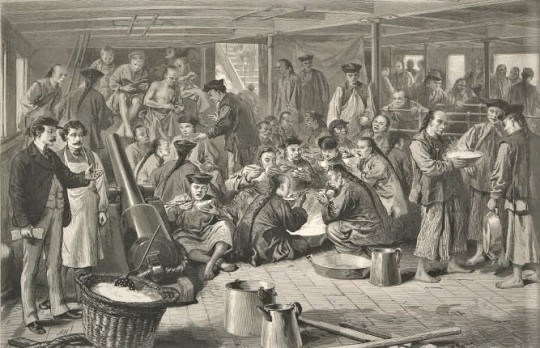
“Chinese Emigration to America,” no date. Illustrator unknown (from the collection of the Bancroft Library). This illustration shows life aboard a Pacific Mail Steamship Co. ship making the passage from China to San Francisco.
Amidst the Gold Rush and burgeoning industries like mining, agriculture, and construction, Chinese immigrants from southern China flocked to California. The PMSSC’s sheds, located along San Francisco’s waterfront, played a crucial role in handling cargo, passengers, and immigrants who arrived via steamships. Serving as pivotal infrastructure, they provided storage space for goods, customs processing areas, and waiting areas for passengers.

Pacific Mail Steamship Co. dock, c. 1864- 1872. Photograph by Carlton Watkins, probably derived from Watkins Mammoth Plate CEW 611. (from a private collection, the Roy D. Graves Pictorial Collection, Bancroft Library; and the San Francisco National Maritime Museum). In this elevated view east from Rincon Hill to the Pacific Mail dock, sidewheel steamer vessels identified by the SF National Maritime Museum as the SS Colorado (built in 1865 and scrapped in 1879), the steamer SS Senator at right (1865-1882), and various sailing ships are seen with Yerba Buena Island in the background. The Oriental Warehouse (built 1867 and still standing at 650 Delancey Street) is at left. The opensfhistory.org site identifies the three-part wooden structure at center as the Occidental Warehouse, used for grain storage, with blacksmith and boiler shops to the left. Ads for C.C. Hastings & Co. Clothing at Lick House can be seen on the fence.
Even as the Gold Rush waned, the PMSSC initiated in 1867 the first regularly scheduled trans-Pacific steamship service, connecting San Francisco with Hong Kong, Yokohama, and later, Shanghai. This route facilitated an influx of Japanese and Chinese immigrants, enriching California’s cultural diversity.

Pacific Mail Steamship Co. docks, c. 1871. Photograph by Carleton Watkins (from a private collection).
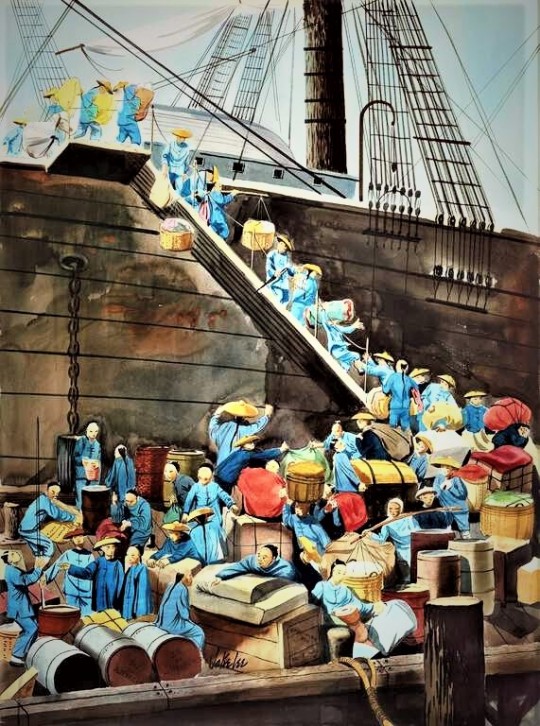
“Disembarking.” Painting by Jake Lee (from the collection of the Chinese Historical Society of America). In this watercolor, one among a suite of paintings commissioned by Johnny Kan for his then-new Kan’s Restaurant on San Francisco’s Grant Avenue in Chinatown, artist Jake Lee depicted a stylized unloading of mostly male passengers at the Pacific Mail Steamship Co. wharf in San Francisco.
When a ship dropped anchor at the dock in San Francisco, the emigrants finally set foot on American soil. A journalist for the Atlantic Monthly in 1869 described the debarkation of 1,272 Chinese as follows:
"… a living stream of the blue coated men of Asia, bearing long bamboo poles across their shoulders, from which depend packages of bedding, marring, clothing, and things of which we know neither the names nor the uses, pours down the plank…. They appear to be of an average age of twenty-five years… and though somewhat less in stature than Caucasians, healthy, active and able bodied to a man. As they come down upon the wharf, they separate into messes or gangs of ten, twenty, or thirty each, being recognized through some to us incomprehensible free-masonry system of signs by the agents of the Six Companies as they come, are assigned places on the long broad shedded wharf [to await inspection by the customs officers]."
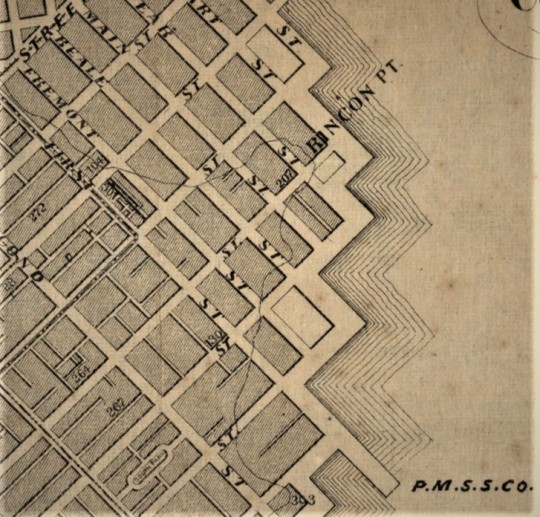
A detail from the "Bancroft's Official Guide Map of San Francisco" of 1873. The lower right corner of the image locates the Pacific Mail Steamship Co. pier at the foot of First Street (at Townsend) running in a southeasterly direction. According to local historian Garold Haynes, "that was before the seawall realignment of the waterfront in the late 1870s."
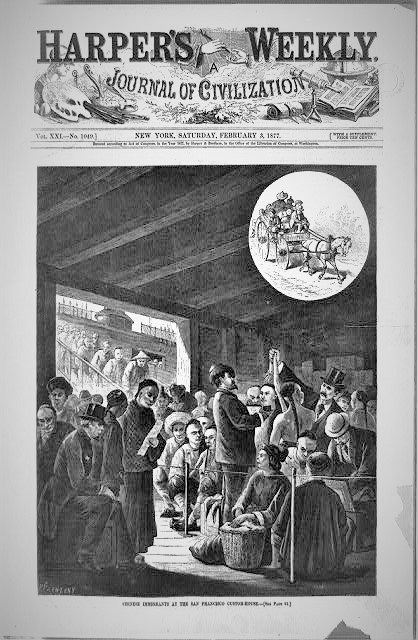
“Chinese Immigrants by The San Francisco Custom House” Harper’s Weekly, February 1877. Illustration by artist Paul Frenzeny (from the collection of the Library of Congress). Chinese immigrants wait for processing in the Pacific Mail Steamship Co.’s sheds while more arrivals from China disembark from the gangway seen in the background.
For many of the immigrants arriving on Pacific Mail steamships, the sheds served as the initial point of contact with the United States. Additionally, the sheds served as immigration processing areas, where Chinese immigrants underwent inspections and screenings. The sheds were a crowded and unsanitary place. Immigrants were often forced to wait for days in the sheds before they could be processed. They were also subjected to medical examinations and interrogations by immigration officials.
As the Atlantic Monthly writer described in 1869 described after each group passed through customs, “. . .They are turned out of the gates and hurried away toward the Chinese quarters of the city hv the agents of the Six Companies. Some go in wagons, more on foot, and the streets leading up that way arc lined with them, running in 'Indian file' and carrying their luggage suspended from the ends of the bamboo poles slung across their shoulders . . .”

In a political cartoon (c. 1888, based on the reference to the Republican Party presidential ticket of 1888 in the upper left corner of the image), Chinese immigrants stream off ships onto the wharves of the Pacific Mail Steamship Co. and the Canadian Pacific Steamship Co. and directly into the factories of San Francisco Chinatown and beyond. Illustrator unknown (from the collection of the Bancroft Library).
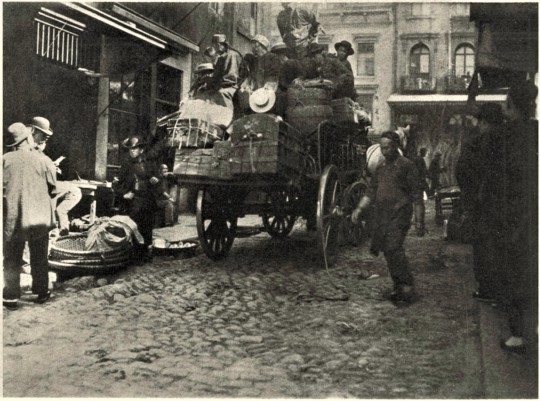
"New Arrivals." Date, location, and photographer unknown. The wagon on which the Chinese are riding, presumably having come directly from the Pacific Mail Steamship Co. wharf to San Francisco Chinatown, appears very similar to the 1877 configuration seen in the upper right corner of the preceding Harper's Weekly illustration.
The surge in Chinese immigration led to anti-Chinese sentiments, as reported in the illustrated magazines of the era. The arrival was often violent, as hoodlum elements would sometimes throw stones, potatoes and mud at the new immigrants. After the arrival in Chinatown, the newcomers were temporarily billeted in the dormitories of the Chinese district associations (citing Rev. Augustus W. Loomis, “The Chinese Six Companies,” Overland Monthly, os. v. 1 (1868), pp. 111-117).

“Hoodlums” Pelting Chinese Emigrants On Their Arrival At San Francisco” c. 1870s. Illustrator unknown (from a private collection). A rough sketch of the Pacific Mail Steamship Co. sheds appears in the background.
In San Francisco, local efforts to stop Chinese immigrants moved beyond the sheds and onto the arriving ships, which often became the focal points for Chinese litigants in the local and federal courts.
For example, in August of 1874, the Pacific Mail Steamship Company’s vessel Japan arrived in San Francisco carrying around 90 Chinese women. The Commissioner of Immigration boarded the ship and conducted interviews with about 50 to 60 of these women. From his inquiries, he concluded that 22 of them had been brought to San Francisco for “immoral purposes,” as reported by the Daily Alta California on August 6, 1874. When the Pacific Mail Steamship Company refused to provide the necessary bonds, the Commissioner instructed the ship’s master to keep the 22 women on board.

Pacific Mail Steam Ship Company’s Steamer, Japan, c. 1868. Print created by Endicott & Co. (New York, N.Y.), Menger, L. R., publisher (from the collection of The Huntington Library). Junks in the foreground, and, to the left in the background, Hong Kong’s Victoria Peak with semaphore at top appears in the background, center right. The SS Japan is flying the American flag from its stern, a Pacific Mail house-flag from the middle mast, and a pennant with the vessel’s name from the aft mast. A flag flying from the first mast appears to be a red dragon on a yellow field. Print includes vessel statistics and the name of the builder, Henry Steers.
Promptly, attorneys representing the detained women sought legal recourse by requesting a writ of habeas corpus from the state District Court in San Francisco. For two days, legal representatives from various parties engaged in debates over whether the Commissioner’s authority under the law was valid and whether the so-called “Chinese maidens” were indeed involved in prostitution. Reverend Mr. Gibson, who claimed expertise in this area, confidently asserted that Chinese prostitutes could be easily identified by their attire and behavior, likening the distinction to that between courtesans and respectable women in the city. He concluded that only half of the women were destined for prostitution. Ultimately, the District Court ruled that all the women should remain detained and ordered them to stay on the ship.
Shortly before the ship Japan was set to depart, the County Sheriff boarded and brought the 22 women ashore based on a writ of habeas corpus issued by the California Supreme Court. Two weeks later, Justice McKinstry, in a brief opinion on behalf of the court in Ex Parte Ah Fook, 49 Cal 402 (1874), affirmed the lower court’s decision, validating the Commissioner’s authority as a legitimate exercise of the state’s police power.
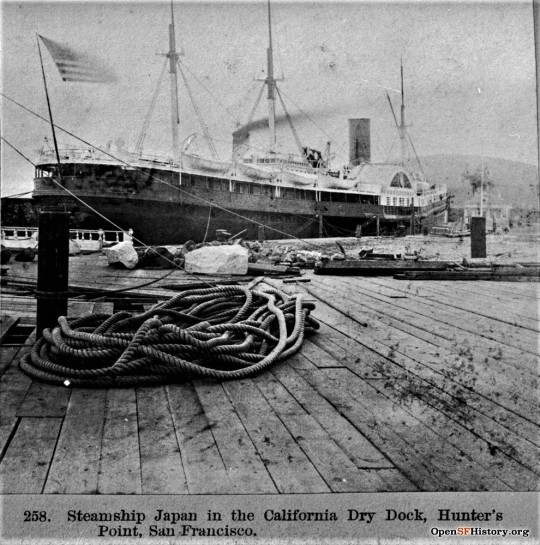
“258. Steamship Japan in California Dry Dock, Hunter’s Point, San Francisco”c. 1869. A side view of the steamship Japan of the Pacific Mail Steamship Company at the dry dock at Hunters Point. Photograph by Thomas Houseworth (from the Marilyn Blaisdell Collection). The ship would become the setting for a controversial habeas corpus case involving the entry of 22 Chinese women over the objections of state authorities in the case of Ex Parte Ah Fook, 49 Cal 402 (1874).
A third writ of habeas corpus presented the matter to the United States Circuit Court, presided over by Justice Stephen J. Field and Judge Ogden Hoffman. During the oral arguments, Justice Field made it clear that he wouldn’t dismiss constitutional arguments as easily as the state Supreme Court had, emphasizing the principle of equal treatment for citizens and non-citizens.
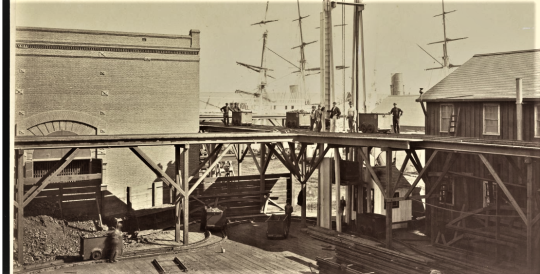
The Pacific Mail Steamship Co. derrick and coal yard in San Francisco, c. 1871. Photograph by Carleton Watkins (from the collection of the California Historical Society).
In the ruling, Justice Field discharged the petitioners, stating that California’s statute surpasses a state’s legitimate police power and violates the principle of “the right of self-defense.” He noted that the statute could exclude individuals who posed no immediate threat to the state. Judge Hoffman, in a concurring opinion, went further, suggesting that the states should have no control over immigration due to the exclusive nature of the commerce clause.
Although the Circuit Court decision released the Chinese women, while limiting the state’s power over Chinese entry, the Japan case reinvigorated California’s efforts to deter Chinese immigration. The influx of Chinese immigrants coupled with high unemployment in the late 1870s allowed Dennis Kearney of the Workingmen’s Party to target the Chinese as scapegoats. The “Chinese must go” movement gained traction, with both the Republican and Democratic parties adopting anti-Chinese stances.

The Pacific Mail Steamship Co.’s wharf in San Francisco. Photograph by Carleton Watkins (from the collection of the Fine Arts Museums of San Francisco).
During the San Francisco Riot of 1877, the sandlot mob attacked the wharves of the Pacific Mail Steamship Company, because this shipping line represented the primary mode of transportation for America-bound Chinese immigrants headed to California. Although the steamships were not burned, the wharves were partially wrecked. Rioters also burned the lumber and hay yards adjacent to the Pacific Mail wharves.
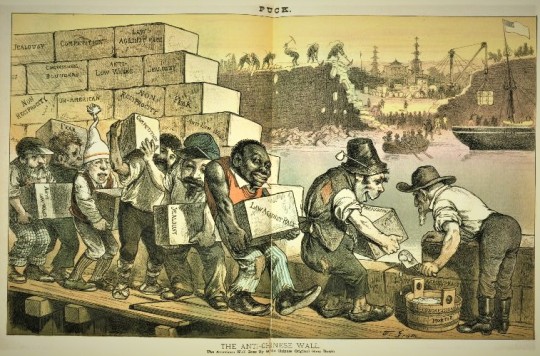
“The Anti-Chinese Wall – The American Wall Goes Up as the Chinese Original Goes Down.” Illustration by Friedrich Graetz in Puck of March 29, 1883 (v. 11, no. 264). The cartoon portrays a multi-ethnic coalition gathered on the wharf to halt Chinese immigration in the aftermath of the passage of the Chinese Exclusion Act in May 1882.
California was able to transfer its racial grievances and resentments to the national stage, culminating in the passage of the Chinese Exclusion Act in 1882. This marked a turning point in the history of Chinese immigration and had profound effects on the Chinese-American community. The Act severely restricted Chinese immigration to the United States.
The use the PMSSC’s sheds posed significant challenges to federal and state attempts to enforce the Exclusion Act (and its punitive extension in the Geary Act of 1892), against all Chinese, regardless of birth or immigration status.
As an article in the San Francisco Call of May 12, 1900, details, the chaotic scene at the Pacific Mall dock where Chinese immigrants disembarked from the ship Coptic was typical for that era. In the Coptic case, federal officials were observed allowing the landing of alleged "coolies" despite the spirit of the exclusion act, causing outrage. The detention shed, initially meant for temporary housing, had become a long-term residence for over 370 Chinese immigrants, generating substantial profit for the PMSSC. The maintenance of this facility posed several concerns, including violations of health regulations and potential disease outbreaks. The Call decried the authorities' negligence in enforcing the law and highlighted the role of a Chinese "ring" in facilitating fraudulent practices and illegal immigration. With multiple ships arriving with more immigrants, the newspaper called for investigation and reform.

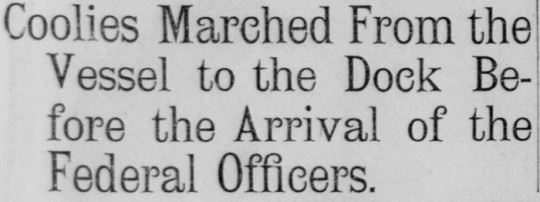


Headlines from the The Call of May 12, 1900, regarding the crowd of detained Chinese immigrants disembarked from the Pacific Mail ships Coptic and America Maru, the lack of security in the Pacific Mail sheds, and alleged immigration fraud.
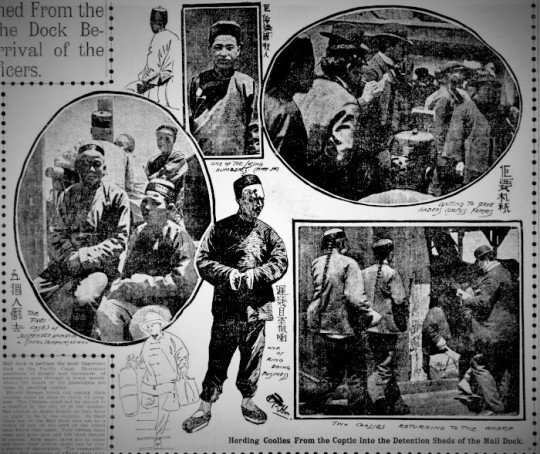
Illustrations and photographs from the San Francisco Call of May 12, 1900, for its report about the crowd of detained Chinese immigrants disembarked from the Pacific Mail ships Coptic and America Maru, the lack of security in the Pacific Mail sheds, and alleged immigration fraud.
For Chinese and other immigrants and travelers from Asia, the transpacific journey, and even entering San Francisco Bay itself, posed hazards. The dangers were never more evident than in the case of the SS City of Rio de Janeiro. Launched in 1878, this steamship had been an essential component of the Pacific Mail Steamship Company's fleet. Its routes connected pivotal locations such as San Francisco, Honolulu, Yokohama, Japan, and Hong Kong, and the ship had played a role in America's expansion into the Far East and the Pacific in the aftermath of the Civil War and during the Spanish American War.

“A Thousand Boys in Blue S.S. Rio de Janeiro bound for Manila” copyright 1898. Published by M.H. Zahner (from the collection of the Robert Schwemmer Maritime Library). Built by John Roach & Son in 1878 at Chester, Pennsylvania, this vessel had served as a vital link between Asia and San Francisco, regularly transporting passengers and cargo. This stereograph shows its charter by the federal government for use as a military troop transport during the Spanish American War.
On the morning of February 22, 1901, the SS City of Rio de Janeiro commenced its approach to the Golden Gate and the entrance to San Francisco Bay. They had sailed with a crew that was mostly Chinese. History indicates that approximately 201 people were aboard the Rio de Janeiro, as follows: Cabin passengers 29; second cabin, 7; steerage (Chinese and Japanese), 68; white officers, 30; Chinese crewmen, 77. Of the Chinese crewmen, only two spoke English and Chinese. During the long voyage, the ship’s officer gave orders by using signs and signals. The ship’s equipment and lifeboat launching apparatus appeared to be in good working order and were capable of being lowered in less than five minutes.
Near the location of the future location of the Golden Gate Bridge, tragedy struck as the SS City of Rio de Janeiro. In the dense morning fog that obscured the surroundings, the ship collided with jagged rocks on the southern side of the strait, near Fort Point. The vessel’s non-watertight bulkheads led to rapid and unstoppable flooding. In a mere ten minutes, the SS City of Rio de Janeiro succumbed to the relentless forces of the sea.
The majority of the passengers, many of whom were Chinese and Japanese emigrants in steerage, were caught unaware in their cabins as the ship sank. The toll was staggering, with 128 lives lost out of the 210 souls on board. Of the 98 Asians reportedly on board the ill-fated ship, only 15 passengers were rescued, and 41 Chinese crewmen survived.

The SS City of Rio de Janeiro in Nagasaki, Japan, c. 1894. Photographer unknown (from the collection of the San Francisco Maritime National Historical Park). The ill-fated ship, which transported passengers and cargo between Asia and San Francisco, sank seven years later after running into rocks near the present site of the Golden Gate Bridge. The never-salvaged shipwreck rests 287 feet underwater.
The sinking of the SS City of Rio de Janeiro represented the deadliest maritime disaster at the San Francisco Bay's entrance, forever etching its name in the annals of maritime history as the “Titanic of the Golden Gate,” drawing a sad parallel to another infamous shipwreck. Today, the case serves as a reminder of the unpredictable forces of nature and the inherent dangers of maritime travel to which thousands of Chinese immigrants and other Asian travelers subjected themselves to gain a better life in America.

"Chinese Passengers on Deck, 1900–15," enroute to Hawaii. Photographer unknown (from the collection of the Hawaii State Archives). Chinese passengers, some eating from rice bowls, crowd the deck of a steamship. After the Exclusion Acts, the numbers of Chinese voyaging to the US had decreased sharply.
Despite reduced immigration due to the passage of successive exclusion acts in 1882 and 1892, the PMSSC's sheds remained operational, their purpose shifting from off-loading immigrants to facilitating trade and commerce between the east and west coasts of the US.

The Pacific Mail Steamship shed on the San Francisco waterfront at the turn of the century. Photograph attributed to Arnold Genthe. Located at the former pier 36, where Brannan Street runs into the Embarcadero, the immigration station was moved to Angel Island in 1910. Pier 36, the last of the docks at Brannan was torn down in 2012. In just one year, 1852, 25,000 Chinese entered California for the Gold Rush and other opportunities. Chinese America began here.
The convergence of the Central Pacific and Union Pacific railroads in Utah in 1869, had started the process of eroding the Pacific Mail's profitability on the Panama-to-San Francisco route over the ensuing decades, eventually leading to the sale or redirection of many of its ships to other routes.

The Pacific Mail Steamship Co. offices on the southeast corner of Market and First streets in downtown San Francisco, c. 1896. Photographer unknown (from a private collection).
The landscape changed drastically in 1906, when a devastating earthquake and subsequent fire struck San Francisco, including the PMSSC’s wharf facilities. Although destroyed during 1906 disaster, the PMSSC’s sheds were rebuilt shortly thereafter. The sheds continued to be used for detaining and interrogating Chinese immigrants until the opening of immigration station facilities on Angel Island in 1910 for the processing Chinese and other immigrants.
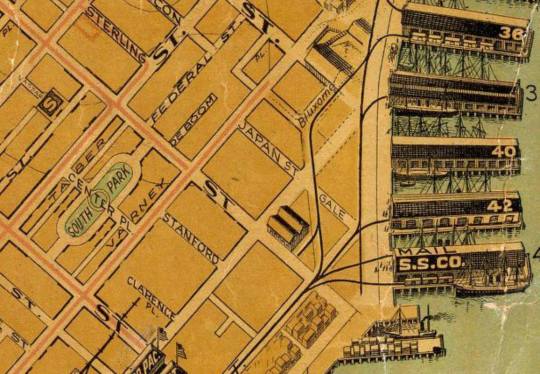
A detail from the August Chevalier Map of 1915. The PMSSC sheds were located on Pier 36 at the intersection of Brannan and First Street.
The legacy of the PMSSC’s sheds, intertwined with their role at the inception of Chinese immigration to California and the US, is deeply rooted in San Francisco's maritime and Chinese American history. Both the company's operations and the experiences of the first wave of the Chinese diaspora arriving on American shores by steamships will remain forever part of the socio-economic dynamics of 19th-century San Francisco and the American West.
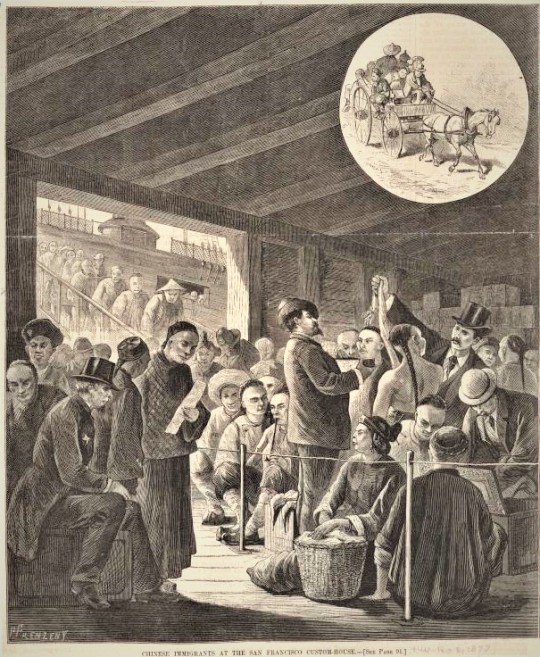
“Chinese Immigrants by the San Francisco Custom House” c. 1877. Detail of the magazine cover illustration by artist Paul Frenzeny for the Harper’s Weekly (from the collection of the New York Public Library.
[updated 2023-10-17]
#Pacific Mail Steamship Co.#Pacific Mail sheds#Chinese immigration detention#Carleton Wtakins#Paul Frenzeny#Harper's Weekly#SS Japan#In re Ah Fook#Stephen Field#Eadweard Muybridge#Pier 36 San Francisco
5 notes
·
View notes
Text
The year-end personal recap concept is OPPRESSIVE to me. I think it's healthy to occasionally check-in with yourself every once in a while but... why do I have to participate in a public ceremony? Why NOW, the one week of the year I'm the most sleepy and listless from all the parties and the holiday food and the laying-around? When nothing is going on NOW to brag about, and it's the longest distance in time from lots of things I do productively? And why do most people have lots of big changes to brag about and I'm usually fishing for stuff to brag about out of my totally-fine life because none of it is status-seeking or photogenic? Just for theoretical purposes, does the angst get any easier if you have a year that makes for an easy and beautiful year end post? Probably not.
Anyway.
2022 didn't feel special while I was living it - it felt like a year where nothing major happened, where there was just a lot of work/planning to do and it was not worth bragging about.
But, uh, holy shit:
Celebrated 10 years of marriage!
I basically started a new career (but, caveat, the position started in November 2021 - yet by New Year's, after something like 5 total weeks of real work, I had no real idea if it would take root. But root it did)
Relating to the second-longest thing going in my life (other than the marriage), my service on the Community Board, a pretty seismic change - I resigned my position as Treasurer (a real piece-of-cake assignment that lets me nose in on the whole board's business) so that I could take the role of Transportation Committee chair, which is a huge upgrade in visibility, control and direct involvement in the issues I've been taking up for years.
Moved into a much nicer apartment, one that isn't a nexus of maintenance crises. More room! All new furniture! A much nicer shower/bathtub!
We have a financial advisor now!
Not only did I have a good biking year...
...and a pretty damn good camping year...
But I bike-camped across THE WHOLE STATE OF IOWA, 462 miles in seven days. First time traveling with the bike!
I went to 10-12 concerts, which is about 9-10 more than I go to in any given year, and they all were at least pretty good!
I went to something like 12 baseball games because I dove in with a CitiField ticket package, and I think it worked out pretty good! (Plus a Yankees game and a Rangers game)
A scenic trip to the Finger Lakes!
Got to do Delaware River rafting again!
I finally read THE POWER BROKER!
I managed to get a short trip to San Francisco, my second time!
Legal weed!
New Peloton bike at home! I'm actually using it!
... and couple other things I'm not going to divulge or air out here!
Anyway, I was very surprised to take a glance at some records and see all of these very big (often long-delayed) things happened all in a short time. Yes, there were *absolutely bad* things that happened too, but the trend seems to be "change and growth" in big ways at once, rather than just ordinary things passing in time and space.
But, the year felt like A LOT. Another theme through most of the year was "don't overcommit yourself!" and that's easier-said-than-done sometimes (especially in a year where seasonal/annual things that were paused for 1-2 years came roaring back all at once). And also "stop wasting time on various maladaptive habits!" (which is less "using social media" and more "reflexively checking social media as much as one blinks") So, from an attention/stimulation standpoint I've really been flying by the seat of my pants and I'm certainly not going to try to ever plan to one-up a year like this one. I am hoping for a relatively calm 2023, already committing to several attention cutbacks.
Every once in a while I get posed the question "where do you see yourself in 5 years" and at one point I thought I could get insight on that by looking at the past 10 years. And from that I saw that the answer was "there is absolutely no telling where you will be in 5 years or what you want to see happen, all you know is that you'll have significantly pulled yourself forward and you won't be where you are now." Because in any 5 year timeframe, that has been the story of the last 20+ years. Recently, I've learned and experienced so much, and have grown so much. And there is so much more opportunity for learning and growth. Life is an experience of taking those opportunities continually. And it's great.
Ironically, the idea of personal growth/progress is a concern where I'm deeply anxious, and fearful of failure. I am going to spend some time unpacking that in 2023. (That's been part of the growth, BTW: insight into bad thinking!) What ties all of this together is that it's a fairly good idea to gut-check that anxiety by looking at an actual recap of events and achievements. Enough happened this year that I should forgive myself if I want to chill out for the next 2 years! If I just did many of the events from this past year all over again in this coming year (like a routine), it'll be fantastic! If there's anything I'm unhappy with now, or anything I'm worried where I don't control whether it goes good or bad... there's literally nothing to worry about because even among setbacks I come out very strongly ahead overall, even in a bad year! (Other than "you shouldn't worry" as a separate but still meaningful lesson)
It is very difficult to remember all of this so I figure it's good for me to jot this down in private. As it turns out, I've got many years of recaps in Tumblr already that are public, so here's another one for the pile. I'm keeping the streak going. Now I don't need to worry about being the guy without a rosy year-end recap.
5 notes
·
View notes
Text
Why It Worked: The Pursuit of Happyness

Introduction: The Pursuit of Happyness is a biographical drama film produced by Columbia Pictures, Relativity Media, Overbrook Entertainment and Escape Artists, with distribution by Sony. Directed by Gabriele Muccino, the film stars Will Smith, his son Jaden, Thandiwe Newton, Brian Howe, Dan Castellaneta and Mark Christopher Lawrence as Chris Gardner, his son Christopher, Linda, Jay Twistle, Alan Frakesh and Wayne. Released on December 15, 2006 and received positive reviews from critics with most critics praising Will Smith's performance. According to Rotten Tomatoes, 67% out of 177 reviews were positive, with an average rating of 6.4/10. The film was also a box office success, grossing $307.1 million on a budget of $55 million. I liked the film well enough when I first saw it as a teenager, but I appreciate it more so now as an adult. Now is the perfect time for sing this movie's praises and go into detail why this film is relevant now that I'm an adult.

The Plot: Based on the true story of Chris Gardner, the film follows him during the recession in 1980s San Francisco where he struggles to make ends meet while taking care of his son. Chris goes from being broke, to getting arrested for not paying parking tickets, losing a couple bone scanners he's trying to sell, having all his money seized by the IRS, and ending up homeless. All these struggles, plus his wife leaving him, would've made a lesser man give up. What makes the film engaging to watch, though, is that Chris NEVER gives up. Every time he's knocked down, he gets right back on his feet and does such a good job as an intern, he's ultimately hired as a full-time stock broker, making all his efforts worth it. In addition to having really strong writing, the film also has some pretty funny moments to balance out the hardship Chris goes through, such as Christopher's God will save me joke and Chris' joke during the interview. The film also has a very well made score by Andrea Guerra with soft piano cues and fitting song choices. Chris' journey wouldn't be fun to live through, but his optimism and the well earned happy ending makes it all worth sitting through.

Cast and Characters: Will Smith definitely earned his nomination for Best Actor for this film. He oozes with optimism, wit, and determination in every scene he's in. I also thought him and his son, Jaden, worked perfectly together. For his acting debut, Jaden nails the innocence and loyalty of Christopher and gives his father ample reason to keep trying. Thandiwe Newton also did a really good job playing Linda, making her sound rightfully frustrated and tired of Chris' failure to make decent income. I really like how kind and understanding Jay Twistle was and Brian Howe gave in a solid performance. Dan Castellaneta was really good as Alan Frakesh, making him sound very busy and authoritative. Walter Robbins was also a really nice man and Kurt Fuller gave in a really good performance. All the other actors did a good job in their respected roles, and I especially like the little cameo at the end of the real Chris Gardner passing Will and Jaden.

Where It Falters: Yikes! This is the only instant in the entire film in which Chris was NOT being a good father. I don't care who you are, where you're from or what your mental issue is: don't EVER tell your child to shut up! This leads to the child thinking they're an annoyance or a burden to their parent.

Conclusion: The Pursuit of Happyness is such an amazing film that I appreciate more as an adult. It has a really good script, well rounded characters, a heartfelt score and an Oscar worthy performance by Will Smith. If you haven't seen this film yet, definitely check it out on Netflix or buy the DVD on Amazon. Trust me, this film will be well worth your time.
#reblog#share#like#follow#drama#biopic#chris gardner#will smith#jaden smith#sony pictures#columbia pictures#the pursuit of happiness
1 note
·
View note
Text
AMD Infinity Guard, BeeKeeperAI Collaborate Secret Computing

AMD Infinity Guard
The prevalence of ransomware attacks and data breaches in recent years has made it difficult for important business sectors to collaborate. Reports state that organizations are unable to work with suppliers who are attempting to develop potentially ground-breaking apps or discoveries due to the risk posed by threat actors. To keep up the strict restrictions necessary for specific data sets, some businesses don’t even share data within. Researchers’ failure to obtain vital data impedes their capacity to conduct significant study in a number of fields, including government, banking, and healthcare.
Healthcare AI acceleration via a safe platform for algorithm creators and data custodians to collaborate
Data is Never Exchanged or Viewed
The data steward’s safe, HIPAA-compliant environment is where the data is never removed.
Processing Real-World and Protected Data
Employs primary data, which comes directly from the source, as opposed to artificial or de-identified data. Every time, the data is encrypted.
Never Is Intellectual Property Seen or Shared
The algorithm is always encrypted, both when it is uploaded to EscrowAI and when it is moving through the container to the data steward and inside the protected environment of the data steward.
Technology with Secure Enclaves
EscrowAI uses secure enclave technology to reduce the possibility of algorithm IP questioning and data exfiltration during computing.
Matchmaker and intermediary
BeeKeeperAI reduces the time, effort, and expenses of data projects by more than 50% by serving as a matchmaker and broker between data stewards and algorithm developers.
Alan Czeszynski, an expert in the security industry and the marketing and product development leader at BeeKeeperAI, was gracious enough to join me on the AMD EPYC TechTalk podcast series following the Confidential Computing Summit industry gathering in San Francisco. They talked about the state of security and how there has never been a greater need for better hardware and software safeguards.
BeeKeeperAI
EscrowAI, a technology that combines private and confidential computing technology to allow software developers, data scientists, and data owners to collaborate in trusted execution environments (TEE), is utilized by San Francisco-based BeeKeeperAI.
The technology of BeeKeeperAI ensures that an owner always has control over their data. In addition to offering end-to-end encryption and algorithmic and model encryption to safeguard intellectual property, BeeKeeper also applies the algorithm to the data. The business establishes a TEE in a cloud data storage environment after an algorithm is prepared to run against data. Consequently, the data is cut off from all stakeholders, including BeeKeeperAI, the cloud service provider, the data owner, and the owner of the algorithm.
Nobody can see what goes on within the TEE; everyone can only access the output to which they are legally permitted.
“Bring these parties together to enable development and testing of artificial intelligence and machine learning models,” according to Alan, is made possible by BeeKeeper’s secure environment.
Big large language models (LLMs) and generative AI have gained popularity, and as a result, businesses are now more conscious of the need to secure AI, according to Alan. Protecting every stage of the AI and machine learning lifecycle has received a lot of attention lately. According to Alan, this is one of the reasons private computing is starting to get a lot of traction.
Alan warns that legacy security solutions might not provide enough protection in the AI era. The problem with LLMs is that they essentially turn into enormous repositories of all your secrets if you wish to locally train them on your own data,” he continued.
While CISOs and IT administrators prioritize data protection, business managers and data scientists frequently place greater importance on obtaining the data required to develop models that improve the company. Alan claimed that it is far too common for the procedure of obtaining private, protected data to be difficult, costly, and time-consuming. He described a few of the intricate details.
It is usually necessary for parties to have detailed, extremely formal data-use agreements in place. There are often several restrictions on how the data can be interacted with. Audits have to be done, and they always have to. BeeKeeperAI eliminates the effort by offering a technical answer to many of these security challenges.
“Their goal is to eliminate that from the end user and basically take it upon selves,” Alan stated. “The platform then allows the true value, which is basically secure collaboration, getting access to the data, developing your models, being able to execute your AI, ML lifecycle in a secure environment.”
Alan acknowledged that the security features incorporated by AMD EPYC CPUs had strengthened BeeKeeperAI’s offerings. AMD Infinity Guard includes these technologies, such as Secure Encrypted Virtualization and Secure Nested Paging, or SEV-SNP. They prevent the contents of a virtual machine’s memory from being accessed by other VMs operating on the same system or the server they are operating on.
Alan also mentioned adaptability, which is another significant advantage of AMD EPYC. AMD have to provide [clients] a variety of possible platforms, and EPYC is a fantastic one,” said Alan. “In those situations, the safe paging feature of encrypted virtualization and secret containers or virtual machines based on the EPYC CPU is quite advantageous. One of the main advantages of utilizing EPYC processors is that algorithm developers no longer have to adhere to any certain OS type thanks to this lift-and-shift technique.”
Read more on govindhtech.com
#AMDInfinityGuard#BeeKeeperAI#Healthcare#AIacceleration#EscrowAI#AI#AMDEPYC#largelanguagemodels#generativeAI#machinelearning#news#Technews#technology#technlogynews#technologytrends#govindhtech
0 notes
Text

ー Activity level: ✦✦✦✧✧✧
ー The Cashing Out (TCO)'s involvement:
TCO - also known as The Cashing Out - is the name of the small group, featuring both Nova, Clay (Nova's brother), Cornelius (Nova's brother-in-law / Clay's husband) and Esmeralda. It is not a widely known name and is only a name shared between the four, though it can be referred also by those who overhears said name. Even then, it is an exclusive name they use for each other so they aren't always saying each other's name.
Anyways, TCO will always be following wherever Nova goes, making her the unofficial leader of the group. Not that she wanted to, but since she keeps them basically together, they don't mind. TCO started off in Chicago in WD1 before moving to San Francisco after being exposed. An idea suggested by Esmeralda to help them throw off anyone from coming after them.
They pretty much ended up helping Dedsec in WD2, which is how Nova ended up working with them.
ー Nova's involvement:
Nova is an info broker, a fixer, and a hacker. She doesn't sit with one job position in the criminal underworld, but instead, extends her business all over. With how her position calls, it makes sense she is doing multiple things at once and not focusing on one thing. She is the best at her job too, coming as close to Dedsec. With the right price, you can hire her, though the price can vary from person to person, especially if she ends up hearing about you.
There is rumors that Nova is a member of Dedsec, though no one can confirm other than the members themselves. She doesn't really confirm or deny it, leaving it to someone's imagination based on her answers. But! During WD2, she is, in fact, working as an ally with the San Francisco's Dedsec. Again, her alliances with them is kept hush hush and only merely rumors.
During the events of WD1, Nova is seen to figure out what's up with Cornelius after hearing that someone wearing a similar face and sharing the same name is running around. So, she can be found hacking and collecting as much information as she can to help her brother-in-law out.
Now, during WD2, she can be found just helping out Dedsec or cozying around San Francisco, doing her job. There's not much activity from her other than her during her duties. Nothing that is big or major.
0 notes
Text
David Sacks ignites Silicon Valley social media flame war http://dlvr.it/TBH9X5 http://dlvr.it/TBH9X9 http://dlvr.it/TBH9XC http://dlvr.it/TBH9XF
0 notes
Text
USA Insurance Agents Email List

Enhance Your Insurance Marketing with USA Insurance Agents Email List by DataScrapingServices.com. In the competitive landscape of the insurance industry, reaching the right audience with tailored marketing campaigns is crucial for success. For insurance companies, brokers, and marketing agencies, having access to a comprehensive and accurate email list of insurance agents can significantly boost outreach efforts and lead generation. DataScrapingServices.com offers a meticulously curated USA Insurance Agents Email List that provides detailed contact information, enabling businesses to connect with insurance agents across the country efficiently. This email list is an invaluable resource for driving targeted marketing campaigns and establishing strong professional relationships.
List of Data Fields
The USA Insurance Agents Email List from DataScrapingServices.com includes a wide range of data fields to ensure a detailed and useful profile of each insurance agent:
Full Name
Email Address
Phone Number
Agency Name
Office Address
City and State
ZIP Code:
Years of Experience
Specializations
Benefits Of USA Insurance Agents Email List
1. Targeted Marketing Campaigns
The USA Insurance Agents Email List enables insurance companies and marketing agencies to create highly targeted marketing campaigns. By utilizing specific data fields, such as location, specialization, and experience level, marketing efforts can be tailored to reach the right audience. This targeted approach ensures that marketing messages resonate with the intended recipients, leading to higher engagement and conversion rates.
2. Efficient Lead Generation
Generating high-quality leads is essential for business growth in the insurance industry. The email list provides direct access to insurance agents who are key decision-makers in their agencies. This facilitates efficient lead generation and accelerates the sales process, allowing businesses to connect with potential clients and partners quickly.
3. Improved Professional Relationships
Access to detailed information about insurance agents allows companies to build and nurture professional relationships more effectively. By understanding agents' specializations and professional backgrounds, businesses can create personalized and relevant communication strategies. This fosters stronger relationships and opens the door to collaboration and partnership opportunities.
4. Cost-Effective Marketing
The USA Insurance Agents Email List enables companies to implement targeted email campaigns with minimal investment compared to traditional marketing methods.
Best Email List Scraping Services Provider
Tire Dealers Email List
Hotel Email Lists
Scraping Plumbers Email List
Scraping Mortgage Mailing Lists
Scraping Electrical Contractors Email List
Scraping Contractors Mailing List
Massage Therapist Email List
Scraping Nightclubs Email List
Nurses Email List
CBD Email List
Best USA Insurance Agents Email List Scraping Services in USA:
Omaha, Mesa, San Francisco, Fort Worth, Kansas City, Austin, Philadelphia, Houston, Chicago, Indianapolis, Orlando, Sacramento, Nashville, Jacksonville, Virginia Beach, Albuquerque, New Orleans, Washington, Bakersfield, Wichita, San Francisco, San Diego, Raleigh, Long Beach, Tulsa, Las Vegas, Denver, Colorado, Fresno, Orlando, Charlotte, El Paso, Atlanta, Memphis, Colorado, Louisville, Seattle, Sacramento, Dallas, San Antonio, Columbus, Milwaukee, Oklahoma City, San Jose, Boston, Long Beach, Fresno, Tucson and New York.
Conclusion
In the competitive insurance industry, having access to a targeted and comprehensive contact list is invaluable. The USA Insurance Agents Email List by DataScrapingServices.com empowers insurance companies, brokers, and marketing agencies to execute highly effective marketing strategies. With detailed information on insurance agents across the country, this list facilitates targeted campaigns, enhances lead generation, and improves professional relationships. To unlock the full potential of your insurance marketing efforts, consider leveraging the USA Insurance Agents Email List from DataScrapingServices.com. Contact us today to learn more and get started on optimizing your marketing strategy.
Website: Datascrapingservices.com
Email: [email protected]
#usainsuranceagentsemaillist#insurancebrokeremaillist#datascrapingservices#webscrapingexpert#websitedatascraping
0 notes
Text
FajitaGate Back In the News, Alleged As Reason for SoMa Restaurant Eviction
15 NOVEMBER 2023
by Joe Kukura
The 21-year-old San Francisco Police Department scandal FajitaGate is rearing its head again, as a new filing in an eviction lawsuit against the SoMa restaurant the Brixton says that the eviction is just retaliation against a co-owner who won a civil settlement against some cops.
This coming Monday will be the 21-year anniversary of the incident that spawned a hilariously named SFPD scandal called FajitaGate. On the night of November 20, 2002, a bartender at Pac Heights bar Blue Light, Adam Snyder, was leaving his place of work after closing time with friend Jade Santoro, carrying a take-out box of fajitas. Three men approached them and demanded the food, and when the two refused, Snyder and Santoro were punched, kicked, and generally roughed up by the three other men.
It turned out that not only were the three other men off-duty SFPD officers, but one of them was the son of then-assistant SFPD chief Alex Fagan. It was alleged that the department tried to bury the matter, as the scandal dragged on for years. The three officers were eventually acquitted of felony assault charges, though Santoro was awarded $32,000 in a subsequent civil suit, Snyder was awarded $9,000, and the SFPD was roundly mocked in the press for a few more years afterward.
Fast forward to last month, when in a seemingly unrelated matter, a restaurant Snyder co-owns was sued by its landlord for $376,000 in unpaid back rent, according to the Chronicle. The restaurant is the Brixton across from Oracle Park (it has another location in the Marina), and the landlord in question is the SF Police Officers Association (SFPOA), which is apparently also in the real estate business.
And Snyder thinks it's no coincidence that the SFPOA wants him out. The Chronicle now reports that the restaurant group says in a legal filing that the eviction is in retaliation for FajitaGate, 21 years ago.
“It’s ridiculous that my decision to call the police for help 20 years ago continues to have ramifications today for myself, my family, our employees and our many investors — including SFPD officers who put substantial resources into this business,” Snyder told the Chronicle. “This is an organization that is supposed to represent our guardians — the people that protect us. But instead of protecting us from harm, they are perpetuating it — they’re forcing us out of business.”
No one is disputing that the Brixton is, in fact, $376,000 behind on their rent. There was a commercial eviction moratorium during the pandemic, and the Brixton’s owners, Hat Trick Hospitality, say they were advised by the SFPOA’s lawyers to not pay rent while brokering an agreement.
The Chron also spoke with independent commercial real estate brokers who say that tons of local restaurants are currently way behind on their rent, and that amnesty-type arrangements are pretty common. So maybe there is something to this landlord's refusal to work with the tenant further.
Indeed, we've seen many of these restaurant landlord-tenant disputes spill into the newspapers recently with establishments like China Live and Park Tavern. But this particular eviction lawsuit is peppered up with the spice of the decades-old police scandal FajitaGate.
0 notes
Text
Modulus Consulting
At Modulus Consulting we are passionate about collaboration, technology, and value. We strive to leverage our expertise, to create a better BIM process, leading to better building for our clients.
0 notes
Text

Choosing A Premier Insurance Broker in San Francisco CA
https://www.aherninsurance.com/law-firm-insurance-san-francisco/ - Welcome to Acrisure San Diego, CA (Ahern Insurance Brokerage) in San Francisco, CA – your trusted source for personalized insurance solutions. From home and auto to business and specialty coverage, our experienced team is dedicated to protecting what matters most to you with tailored solutions.
0 notes
Text
One of the biggest cryptocurrency exchanges, Kraken, was sued by the Securities and Exchange Commission on Monday, claiming that it had operated unlawfully without registering as a securities exchange. This action represents the SEC's most recent attempt to regulate the cryptocurrency market. Important Details In a press release, the SEC claimed that Kraken had made "hundreds of millions of dollars" illegally since 2018. By operating without a license, the SEC claims that Kraken "has deprived investors of significant protections." According to the lawsuit, Kraken should register with the SEC since many of the cryptocurrency assets that its customers can trade on the platform are legitimately classified as securities. However, Kraken has been operating as a securities exchange, broker, dealer, and clearing agency all at once without registering with federal regulators. In addition, Kraken is charged with having inadequate internal controls and bad recordkeeping procedures, which the SEC claims pose a number of risks for its clients. These include "commingling its customers' money with its own" and funding operations out of the accounts that contain client funds. The lawsuit was filed in San Francisco federal district court and asks the judge to disgorge ill-gotten gains along with interest and penalties and to stop Kraken from operating as an unlicensed exchange. As opposed to It is their intention to vigorously defend their position in court, Kraken stated in a statement. The business claimed that the SEC's earlier attempt to classify cryptocurrency assets as securities was rejected by the courts. According to the statement, Kraken is not being sued for fraud, market manipulation, customer losses from compromised security or hacking, or breaches of fiduciary duty. A digression Kraken's problems with the SEC go back a long way. As part of a settlement with the SEC, Kraken consented to stop providing its staking services in February and to pay a $30 million penalty. Key Background The latest lawsuit filed by the SEC against cryptocurrency exchanges, Kraken (officially known as Payward Inc. and Payward Ventures Inc.), comes as the agency attempts to regulate the cryptocurrency industry. Chairman of the SEC Gary Gensler has long hinted that cryptocurrency would be subject to stricter regulation. He has suggested that many cryptocurrencies, not just bitcoin, should fall under federal securities laws and claimed that there was a lot of "fraud, scams, and abuse" in the market because there were no safeguards for investors. The cryptocurrency sector has resisted these attempts, claiming that the SEC is being unduly hostile and that the present securities laws are incompatible with cryptocurrencies. The SEC also filed lawsuits against Beaxy, Coinbase, and Binance this year. It accused Binance of misusing consumer funds and running an unlicensed exchange in the United States when it filed a lawsuit against the company in June. Another cryptocurrency trading platform, Beaxy, was shut down by the SEC in March after the agency filed charges against it for neglecting to register as an exchange and for allegedly having its founder steal money from users. In the meantime, the massive exchange FTX crashed last year, and earlier this month, Sam Bankman-Fried, the exchange's founder, was found guilty of fraud. Source link
0 notes
Text
ICBC US unit gets funds to pay US$9 billion for trades after ransomware attack
ICBC pumps funds into US unit after ransomware attack to pay US$9 billion for unsettled trades, hires cybersecurity firm
ICBC’s US unit told market participants on Friday it was hoping to finish the cyber review over the weekend, but the sources said they expected it would spill into next week. Meanwhile, the bank is using manual processes to trade, they said.
The details, including the cash injection for unsettled trades, have not been previously reported.
The ransomware attack was claimed by cybercrime gang LockBit, a widely deployed ransomware first seen on Russian-language-based cybercrime forums in January 2020. It is the latest in a string of ransom demands by hackers this year.
Ransomware attack on ICBC unit disrupts US Treasury market trades10 Nov 2023
The cyberattack sent ripples through the US Treasuries market, where ICBC acts as a broker for hedge funds and other market participants, helping them trade in the securities. While the extent of disruption to market was limited, it brought into focus the resilience of a market that underpins global finance.
When the hack happened earlier this week, ICBC was unable to access its systems, leaving it temporarily owing BNY US$9 billion for unsettled trades, two of the sources said. The custody bank is the sole settlement agent for Treasuries.
The Chinese parent then injected capital into the US unit, allowing it to settle the trades and pay back BNY Mellon, the sources said. That has now happened, they said.
ICBC did not respond to a request for comment. ICBC Financial Services, the bank’s US unit, has said it was investigating the attack that disrupted some of its systems, and making progress toward recovering from it.

ICBC’s representatives told market participants on a call organised by the Securities Industry and Financial Markets Association (SIFMA), a trade group, on Friday afternoon that they had hired a cybersecurity firm to do an assessment to ensure that its systems are safe, three sources familiar with the matter said.
SCMP Today: Intl Edition Newsletter
Start your day with our briefing on business, politics and important news stories from Hong Kong, Asia, and beyond.
By submitting, you consent to receiving marketing emails from SCMP. If you don't want these, tick here
ICBC said it hopes to be done as soon as this weekend, the sources said, noting that it could take longer, given the complexity of the task. They also told market participants about the capital injection but did not disclose the amount or the reason for it, the sources said.
Meanwhile, ICBC’s computer systems have been isolated from the rest of Wall Street, the sources said. But alternative systems have been put in place to enable trading by ICBC, which involve moving information manually, including by carrying USB sticks with information, two of the sources said.
SIFMA declined to comment.
Yellen, Chinese counterpart begin talks to lay groundwork for Biden-Xi meeting10 Nov 2023
Global regulators on Friday were monitoring the impact. US Treasury Secretary Janet Yellen said on Friday that she and China Vice Premier He Lifeng spoke about the issue during talks in San Francisco this week. She said the hack had not interfered with the market for US government debt.
Rumours about the hack started to circulate in the market on Wednesday afternoon, but one of the sources close to a major marketmaker said it was not clear to most people on Wall Street what was going on until Thursday morning.
As news of the hack spread, other firms started removing any connectivity between ICBC’s computer systems and their own, the source said. SIFMA, the trade group, organised calls for market participants with updates, the sources said.
ICBC is not among the top-tier firms that deal in Treasuries, including the primary dealers that trade directly with the New York Federal Reserve, which limited the impact it had on the market, the sources said.
ICBC chosen as bookrunner for Saudi Arabia’s US$11 billion syndicated loan18 Sep 2023
Still, Scott Skyrm, who works at money market trading firm Curvature Securities, said overnight rates in the repo market were volatile and closed Thursday at levels lower than would have otherwise been the case. There was a rise in the number of firms that failed to return bonds they had borrowed.
US Treasury fails, the value of Treasury securities that were not delivered to fulfil a trade contract, rose to US$62.2 billion on Thursday, the highest since March, up from US$25.5 billion a day earlier, according to Depository Trust & Clearing Corp.
To give the market more time to settle trades, the Federal Reserve’s system for moving cash through the financial system said it had extended the closing time for certain customers on Friday.
“These cyberattacks are scary,” said Jack McIntyre, a fixed-income portfolio manager at Brandywine. “The good news would be that I guarantee you primary dealers are having (a) discussion to make sure this cannot happen to them. I’m sure everybody’s doing a deep dive on their security systems.”
ICBC’s Hong Kong-listed shares ended Friday down 0.8 per cent, compared to a 1.13 per cent drop in a Hong Kong index of mainland Chinese banks. Its Shanghai-listed shares closed flat.
0 notes
Text
International Real Estate by Carlos Advisor
Website: https://www.carlosgutierrezadvisor.com/ Address: San Francisco Convent 1 block East, on Corrales St, Granada, Nicaragua. Phone: +1 954 378 9556 Business E-mail: [email protected] International Real Estate by Carlos Advisor is a YouTuber & Realtor dedicated to offering the most interesting real estate opportunities in Nicaragua, the Dominican Republic, Guatemala, Costa Rica, and some locations in the United States. As a real estate agent with over 14 years of experience, with Carlos Advisor you can buy or sell properties easily and confidently in different countries of Central America, the Caribbean areas, and the US. Don't hesitate to contact me today at my phone number +1 954 378 9556 or by email at [email protected]! I respond immediately! Business Hours: Mon to Fri 8am to 5pm, Sat 8am to 12pm, Sunday closed. #Real Estate Agency#Real Estate Agency#Granada Nicaragua Realtor#Real Estate Broker#Real Estate Agent#Realtor Nicaragua#Real Estate Nicaragua#Bienes Raices Nicaragua#Inmobiliaria Nicaragua#Pa-yment Methods: Paypal#Payoneer#Bank Transfer#Cash


1 note
·
View note